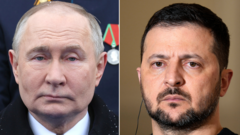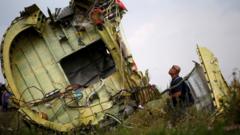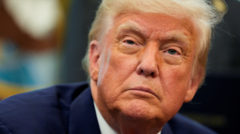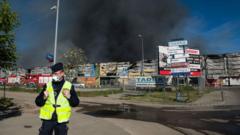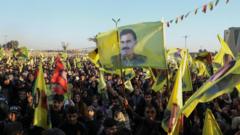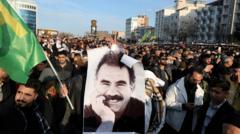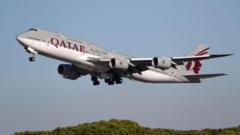Zelensky's forthcoming visit to Turkey aims to facilitate direct talks with Putin, amid calls from allies for an urgent ceasefire.
Zelensky Plans Turkey Talks, Urges 30-Day Ceasefire with Putin
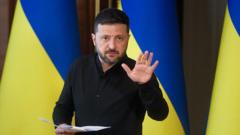
Zelensky Plans Turkey Talks, Urges 30-Day Ceasefire with Putin
Ukrainian President commits to securing a ceasefire and engaging in negotiations with Russia.
In a significant move to de-escalate tensions, Ukrainian President Volodymyr Zelensky announced his intention to travel to Ankara, Turkey, to meet with President Recep Tayyip Erdogan. During a press conference held on short notice, Zelensky expressed his readiness to engage in direct negotiations with Russian President Vladimir Putin, who has yet to confirm his attendance for the proposed meeting set for Thursday in Istanbul.
Zelensky emphasized that securing a 30-day ceasefire is his top priority. He referenced the last direct exchanges between the two leaders, which were held in Istanbul back in March 2022, shortly after the onset of Russia's full-scale invasion of Ukraine. Notably, the Kremlin has remained tight-lipped on the details of Putin's potential participation, stating announcements would occur only at the Russian president's discretion.
The urgency of Zelensky's announcement seeks to amplify pressure on Russia for a response, even as the Kremlin has cautioned that external pressure is ineffective. Their focus, according to Russian officials, lies in a long-term resolution addressing the fundamental causes of the conflict. However, Zelensky is adamant that he will pursue these talks while prioritizing the ceasefire, which has garnered consensus from Ukraine's allies.
The dynamics are further complicated by the participation of a high-ranking US delegation expected to be present in Istanbul, with speculation about President Donald Trump potentially joining if negotiations appear promising. Nonetheless, the Kremlin has downplayed expectations of Putin's physical attendance.
As discussions loom, doubts persist over Ukraine's adherence to any agreements, as expressed by Russian Deputy Foreign Minister Sergei Ryabkov. Meanwhile, European Union leaders urge both sides to proceed with dialogue, but skepticism remains about Putin's willingness to meet. Zelensky's administration interprets Putin's readiness for discussions as a sign of fear, asserting that failure to attend would signal unwillingness to seek an end to hostilities.
The situation is further exacerbated by recent military and diplomatic efforts from Ukraine's allies. Leaders from the UK, Germany, France, and Poland visited Kyiv over the weekend to warn Russia of impending sanctions unless a ceasefire is agreed upon. The European Union is actively working on its 17th package of sanctions aimed at pressuring Moscow to comply.
Zelensky emphasized that securing a 30-day ceasefire is his top priority. He referenced the last direct exchanges between the two leaders, which were held in Istanbul back in March 2022, shortly after the onset of Russia's full-scale invasion of Ukraine. Notably, the Kremlin has remained tight-lipped on the details of Putin's potential participation, stating announcements would occur only at the Russian president's discretion.
The urgency of Zelensky's announcement seeks to amplify pressure on Russia for a response, even as the Kremlin has cautioned that external pressure is ineffective. Their focus, according to Russian officials, lies in a long-term resolution addressing the fundamental causes of the conflict. However, Zelensky is adamant that he will pursue these talks while prioritizing the ceasefire, which has garnered consensus from Ukraine's allies.
The dynamics are further complicated by the participation of a high-ranking US delegation expected to be present in Istanbul, with speculation about President Donald Trump potentially joining if negotiations appear promising. Nonetheless, the Kremlin has downplayed expectations of Putin's physical attendance.
As discussions loom, doubts persist over Ukraine's adherence to any agreements, as expressed by Russian Deputy Foreign Minister Sergei Ryabkov. Meanwhile, European Union leaders urge both sides to proceed with dialogue, but skepticism remains about Putin's willingness to meet. Zelensky's administration interprets Putin's readiness for discussions as a sign of fear, asserting that failure to attend would signal unwillingness to seek an end to hostilities.
The situation is further exacerbated by recent military and diplomatic efforts from Ukraine's allies. Leaders from the UK, Germany, France, and Poland visited Kyiv over the weekend to warn Russia of impending sanctions unless a ceasefire is agreed upon. The European Union is actively working on its 17th package of sanctions aimed at pressuring Moscow to comply.

